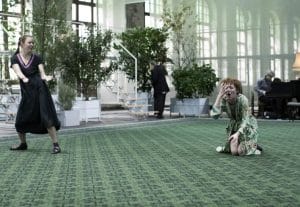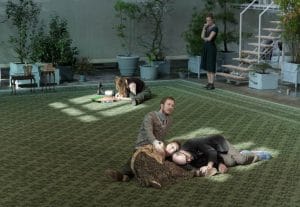De afgelopen jaren maakte de artistiek leider van Toneelgroep Amsterdam, Ivo van Hove, drie voorstellingen van werken van Couperus. In drie korte interviews blik ik terug op het laatste deel, Kleine Zielen. Ondanks de lange meanderende zinnen en de romantische, soms erg passieve personages is dit boek (of eigenlijk zijn het vier boeken)een tijdloos meesterwerk dat, wat mij betreft, alle aandacht verdient.
Eerder sprak ik de bewerker van de ‘boeken der kleine zielen’ Koen Tachelet en daarna de dramaturg van deze laatste productie, Jan Peter Gerrits. Tot slot vroeg ik actrice Maria Kraakman naar ‘haar’ Couperus.
Couperus-actrice met de juiste temperatuur
Maria Kraakman kunnen we inmiddels een heuse Couperus-actrice noemen. In 2007 vertolkte ze al de titelrol in Eline Vere van het Nationale Toneel. Bij Toneelgroep Amsterdam speelt ze mee in ieder deel van Van Hove’s drieluik. Ze gaf drie totaal verschillende vrouwen vorm: de intellectuele Eva Eldersma in Stille Kracht, de kordate Ina d’Herbourg in Dingen die voorbijgaan en hedonistische Mathilde in Kleine Zielen.
Ik ben simpelweg benieuwd hoe deze frêle actrice de blozende voluptueuze Mathilde vormgeeft. Het is een prachtige ongelofelijk transformatie waarover Kraakman zelf bescheiden zegt ‘ Ivo cast op temperatuur’. Deze Mathilde borrelt over van levenslust. Iedere beweging van haar heupen zeggen: ‘Dans, lach, bewonder!’

Voor Maria Kraakman is er een Couperus voor en een Couperus na Bas Heijne. Deze schrijver en publicist blies het stof van Couperus. Dat deed hij, onder andere, in de Huizingalezing en de essaybundel ‘Angst en Schoonheid’. Hij bevrijdde Couperus’s universele thema’s uit de Haagse microkosmos. Verlangens, grip op het leven zoeken en je identiteit vormgeven zijn ontegenzeggelijk onderwerpen waarmee we in de 21 ste eeuw ook worstelen.
Koloniale relevantie
De actrice werd de afgelopen jaren ook geraakt door de meer geëngageerde kant van Couperus. Hoe hij destijds over Indië schreef met het bewustzijn dat er sprake was van uitbuiting en onderdrukking, een gesprek dat ruim honderd jaar later nog steeds gaande is.
Nederland worstelt nog steeds met het onder ogen zien van haar Nederlands-Indië tijdperk en de met geweld verworven rijkdommen. Alleen al de afgelopen maanden kregen de weduwen van de slachtpartij in Sulawesi genoegdoening. Werd er een rechtszaak gevoerd of Nederlandse mariniers opdracht hadden de Molukse gijzelnemers van de treinkaping in de Punt standrechtelijk te executeren. En vorige week kende de Nederlandse overheid de nog levende KNIL militairen hun pensioen toe. Kortom Nederland worstelt nog steeds met de schaduwzijde van haar voormalige overheersersrol in de koloniën.
De blozende buitenstaander
In dit toneelstuk van Kleine zielen is Indië echter ver weg, zelf het Haagse leven lijkt een eeuwigheid geleden voor de dolende zielen in de villa te Driebergen-Zeist. Alleen Max Brauws, de huisvriend vertolkt door Hans Kesting, vertelt over zijn mislukte pogingen om arbeider te worden en ongelijkheid die tussen hem en de ander bleef bestaan. Hij kon, dankzij zijn familiekapitaal, immers altijd weer weg.
Maria Kraakman speelt dus een schitterende Mathilde, die blozende gezonde doktersvrouw die terugverlangt naar Den Haag. Naar een leven op stand met haar sjieke dokter-echtgenoot en hun twee kinderen. Visites, jurken, misschien het hof. Het zijn de dromen van een eenvoudig meisje dat zich omhoog gehuwd heeft en nooit meer terug wil kijken. Mathilde is de vrouw ‘you love to hate’. Addy trouwde haar om zijn familie een voorbeeld te stellen, zo kan het ook! Haar gezondheid is in contrast met Constance’s ziekelijke familie verfrissend en jaloersmakend. Ze kijken neer op haar en haar ‘platte’ verlangens. En ook zij strijdt met de anderen om aandacht van Addy.

Kraakman noemt Mathilde misschien wel een van de meest hedendaagse personages met haar individuele zoektocht naar geluk als het hoogste goed. Ook Mathilde is jaloers, op de fijngevoeligheid en de afkomst van haar schoonfamilie. Ze spreekt hun taal niet en zal nooit een van hen worden.
De vrouw die alles heeft?
Kraakman schetst hoe Van Hove je als acteur veel ruimte geeft om dingen te laten zien, ‘show, don’t tell’. Ik (HR) zag dat terug in talloze tableaux vivants die de acteurs maken. Op het grote tapijt dat het huis uitbeeldt, verstillen Mathilde en haar schoonouders in poses. Poses waarin ze hunkeren naar liefde van hun Addy. Een mooie verwijzing naar het decadente tijdverdrijf van de hogere kringen wordt zo meegeweven in het leven in dat stille huis, waar mensen alleen nog maar kunnen dromen. Ook Mathilde. Want als Addy uiteindelijk overstag gaat en aanbiedt een nieuw leven in de grote stad met haar te beginnen, kan ze de superioriteit van zijn offer niet aannemen.
Na twee uur zinderend theater, is het niet Mathilde, maar een andere vrouw die durft te gaan leven..
Klik voor speeldata van alle drie de voorstellingen en kaarten hier.
